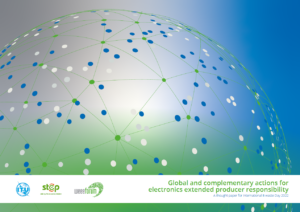 13/10/2022
13/10/2022A thought paper for International E-waste Day 2022
Consumption rates of electrical and electronic equipment (EEE) have grown drastically in the last few decades, causing a rapid increase in the amount of e-waste generated. On average, the total weight of global EEE consumption excluding photovoltaic panels increases by 2.5 million metric tonnes every year. The collection of e-waste is important to help prepare for potential material shortages and supply chain disruption, to improve environmental and human health conditions, to create jobs, reduce the digital divide and ultimately shift to a circular economy. E-waste collection is increasingly being carried out in response to regulation where the extended producer responsibility (EPR) principle is the driver. Within EPR, the manufacturers are responsible for the environmental impact of their products.
As part of a collaboration for International E-Waste Day 2022, The International Telecommunication Union, the WEEE Forum, and StEP have prepared this thought paper presenting complementary solutions and concepts to propel e-waste collection rates in line with EPR-based regulation, whilst also delving into the perceived need for an international regime around EPR to assist with harmonization efforts.
Key messages:
- Complementary actions need to be explored to create an enabling environment for e-waste collection to keep up with the rising generation of e-waste, both to complement existing EPR regulation and in places where there is not existing policy framework.
- Complementary actions can be wide in scope, from commercially or not-for-profit driven to solution based actions, including deposit-return or refund schemes, public-private-partnerships, as well as the all-actors approach and the best-of-two worlds philosophy.
- Not only producers but all relevant actors, including regulators, consumers, and recyclers, must play a role in the EPR system in order to successfully increase the collection of e-waste.
- Complementary actions can operate across national borders, but these would benefit greatly from an international regime, with the objective of overseeing a global approach to tackling e-waste and of ensuring the harmonization of national EPR approaches.
- An international regime, a global secretariat, a partnership structure, a global treaty or other UN initiative to cover several critical areas of e-waste management and related EPR approaches would reduce the current fragmentation of stakeholders in the electronics sector and increase open dialogue between governments and industry.
Read the full thought paper here:
Global And Complementary Actions For Electronics Extended Producer Responsibility
About
The WEEE Forum a.i.s.b.l. is an international association representing 51 producer responsibility organisations across the globe. Together with our members, we are at the forefront of turning the extended producer responsibility principle into an effective electronic waste management policy approach through our combined knowledge of the technical, business and operational aspects of collection, logistics, de-pollution, processing, preparing for reuse and reporting of e-waste. Our mission is to be the world’s foremost e-waste competence centre excelling in the implementation of the circularity principle.
Transparency Register ID 702397445-73.
Copyright 2019 All Rights Reserved
Contact
BluePoint conference and
business centre
Boulevard Auguste Reyerslaan 80
B-1030 Brussels
Belgium
Newsletter
Subscribe to our mailing list to get the updates to your email inbox.